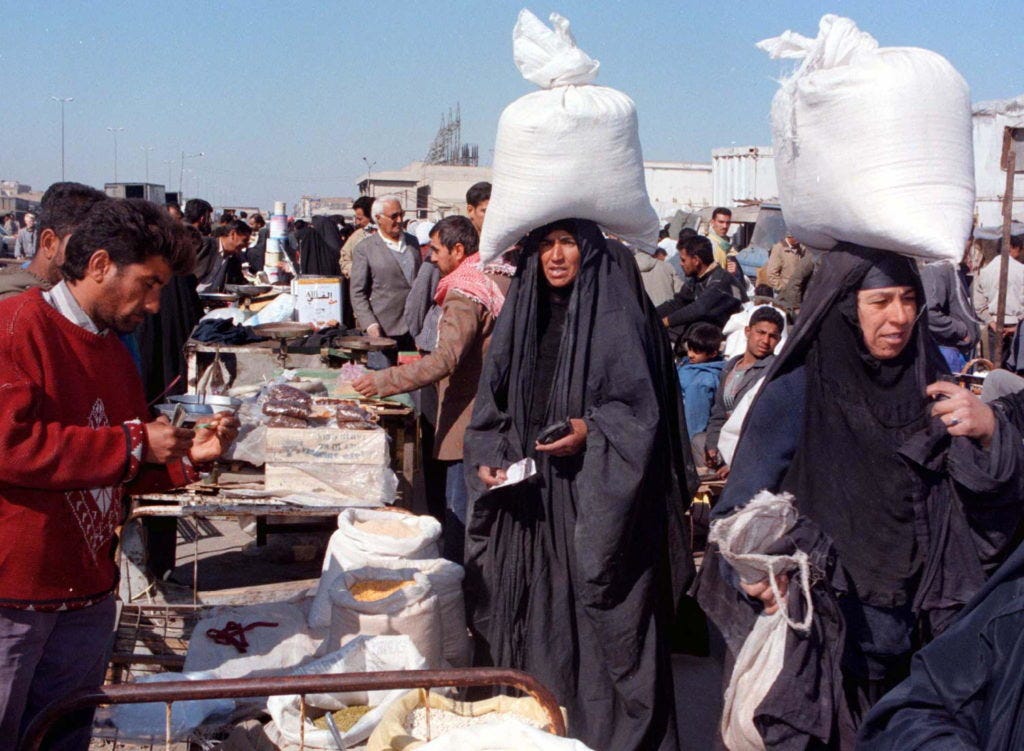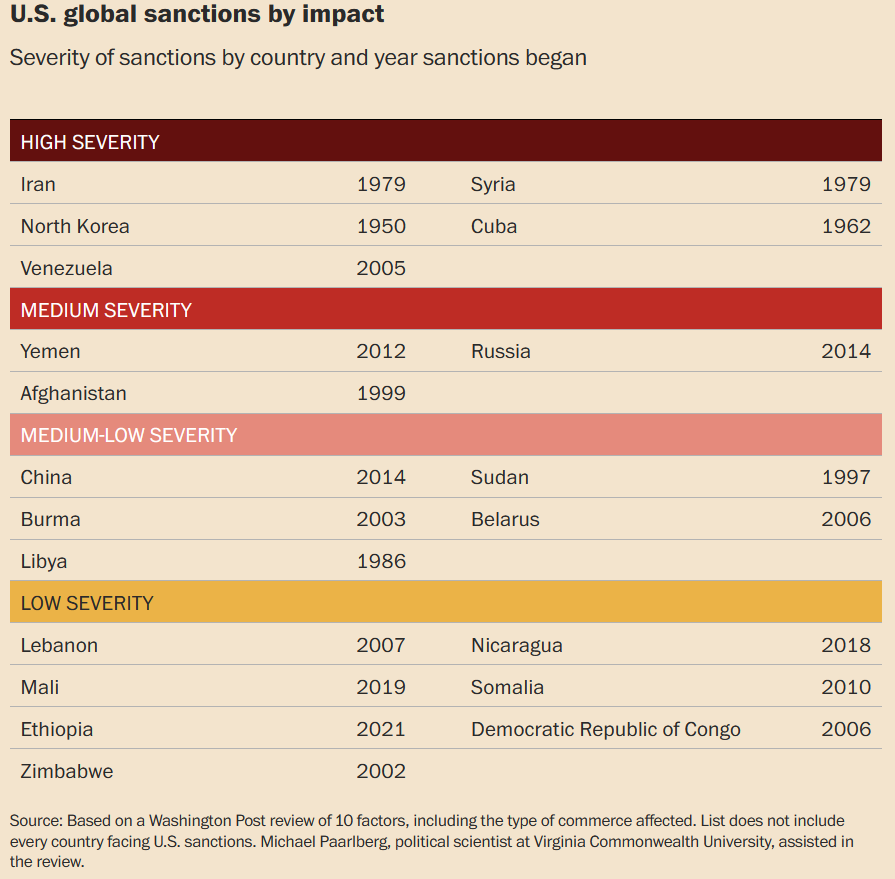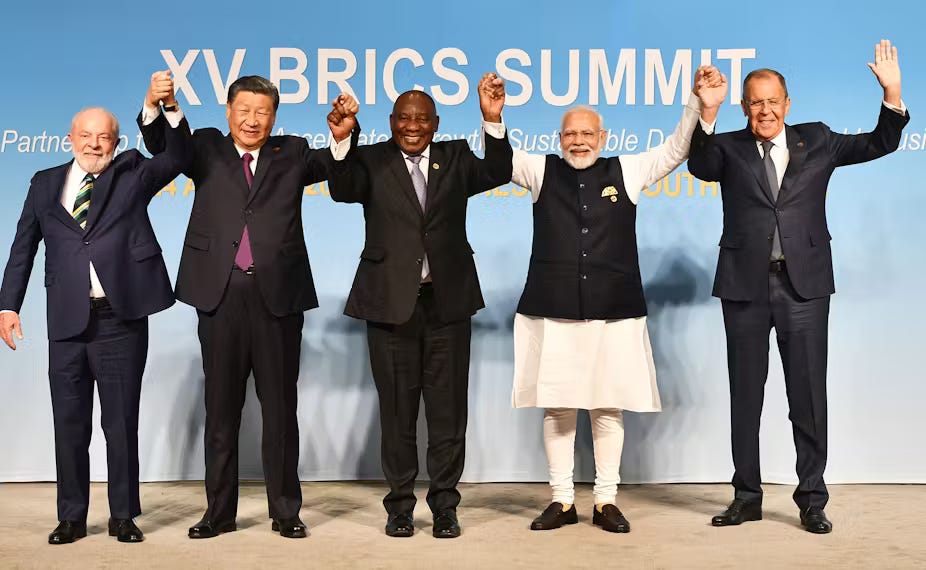Collapsing Empire: The Day Sanctions Died
All my investigations are free to access, thanks to the generosity of my readers. Independent journalism nonetheless requires investment, so if you took value from this article or any others, please consider sharing, or even becoming a paid subscriber. Your support is always gratefully received, and will never be forgotten. To buy me a coffee or two, please click this link.
In July, the Washington Post published a series of revelatory investigations into the US government’s excessive use and abuse of economic sanctions in recent years. The articles exposed in forensic detail how these measures “have become an almost reflexive weapon in perpetual economic warfare” against “enemy” states, individuals, organisations, and businesses the world over. However, as amply documented by WaPo, in lock-step ever-ratcheting overreliance on sanctions has begun to catastrophically backfire.
Today, the Empire “imposes three times as many sanctions as any other country or international body, targeting a third of all nations with some kind of financial penalty,” WaPo notes. The US is “imposing sanctions at a “record-setting” pace again this year, with more than 60 percent of all low-income countries now under some form of financial penalty.” Both Democrat and Republican administrations find sanctions “increasingly irresistible.” Along the way, their international vassals have become equally drunk on the supposed potency of sanctions.
“The mentality, almost a weird reflex, in Washington has just become: If something bad happens, anywhere in the world, the US is going to sanction some people,” Ben Rhodes, Barack Obama’s deputy national security adviser, told WaPo. “It is the only thing between diplomacy and war and as such has become the most important foreign policy tool in the US arsenal,” a DC-based think tank apparatchik echoed. But, they added, “nobody in government is sure this whole strategy is even working.”
Accordingly, WaPo reports that the deleterious “overuse” of sanctions “is recognized at the highest levels” of the US government, and “concern about their impact has grown” in line with their use: “Some senior administration officials have told President Biden directly that overuse of sanctions risks making the tool less valuable.” However, US officials still can’t kick their sanctions habit, “[tending] to see each individual action as justified, making it hard to stop the trend.”
This is understandable. After all, for decades sanctions were one of the most devastatingly effective weapons in the Empire’s arsenal, allowing for brutal overseas wars to be fought and won via non-military means. As WaPo records, “by cutting their targets off from the Western financial system,” sanctions could “crush national industries, erase personal fortunes and upset the balance of political power in troublesome regimes - all without putting a single American soldier in harm’s way.” As we shall see though, that US superpower is now perilously close to being spent.
‘Sanctioned Party’
While US leaders have been sanctioning adversaries since the country’s 1776 founding, Iraq’s 1990 invasion of Kuwait “gave rise to a new form of the weapon.” Baghdad was immediately subject to a total international blockade, making exporting oil - its primary source of revenue - and importing even basic supplies all but impossible. Following the Gulf War, with the country’s decimated infrastructure incapable of being rebuilt, hunger and preventable diseases spread like wildfire. A 1991 UN report described conditions locally as “near-apocalyptic” and “pre-industrial”.
Those sanctions remained in place against Baghdad until the criminal 2003 Anglo-American invasion. Asked in 1996 whether the estimated half a million Iraqi children killed by sanctions was “worth it”, then-Secretary of State Madeleine Albright replied in the affirmative. That year, sanctions on Yugoslavia imposed in May 1992 were lifted. At one point producing inflation of 5.578 quintillion percent, drug abuse, alcoholism and suicides skyrocketed, shortages of essential goods were constant, innocent civilians died needlessly, and Belgrade’s once thriving independent industry was crippled.
As WaPo explains, following the Soviet Union’s 1991 collapse, the US became the world’s “unrivaled superpower.” Governments and banks around the world were dependent on the US dollar, still the world’s dominant currency. The greenback “undergirds international trade even when there is no connection to an American bank or business.” Today, most major commodities, such as oil, remain priced and sold globally in dollars. Even countries trading in their own currencies rely on dollars to complete international transactions.
This makes the US Treasury “gatekeeper to the world’s banking operations” - in turn, “sanctions are the gate.” Treasury officials “can impose sanctions on any foreign person, firm or government they deem to be a threat to the US economy, foreign policy or national security.” Targets needn’t even be accused, much less convicted, “of a specific crime.” Once sanctions are applied, it immediately becomes “a crime to transact with the sanctioned party.” Growth of sanctions has been exponential over the past three-and-a-half decades. WaPo reports:
“As recently as the 1990s, the Treasury Department’s Office of Foreign Assets Control (OFAC) was responsible for implementing just a handful of sanctions programs. Its staff fit comfortably in a single conference room. One of its major responsibilities was blocking American sales of Cuban cigars.”
Following 9/11, the Empire’s penchant for sanctions became a full-blown addiction. Fast forward a decade, WaPo reveals, the US sanctions business was booming to such a degree that OFAC’s then-director Adam Szubin performed a rousing ditty, “Every Little Thing We Do Is Sanctions”, set to the tune of “Every Little Thing She Does Is Magic” by The Police, at a staff party in a Washington DC hotel. Hallucinatory and dystopian barely covers it.
Then, while President, Donald Trump “used sanctions for retribution in ways never conceived.” This included, for example, sanctioning International Criminal Court officials, after they “opened a war crimes investigation into the behavior of US troops in Afghanistan.” Such was the inexorable sanctions drive, Caleb McCarry, State Department lead on Cuba policy during George W. Bush’s administration, testifies that even Treasury staff began craving:
“Relief from this relentless, never-ending, you-must-sanction-everybody-and-their-sister, sometimes literally, system.”
Today, McCarry believes sanctions are “way, way overused, and it’s become out of control.” Per WaPo, this view is widespread in US imperial halls of power. The outlet reports, “by the time of Biden's inauguration, a consensus had emerged among his transition team that something had to change.” So it was in summer 2021, “five Treasury staffers worked up an internal draft proposing to restructure the sanctions system.” It ran to “roughly 40 pages”, and “represented the most substantial revamp of sanctions policy in decades.”
Just like the Bush, Obama and Trump administrations though, “Biden’s team found the power difficult to give up.” Treasury insiders tell WaPo that “their bosses [took] out key parts of their plan.” The finished product - “2021 Sanctions Review” - was released in October that year. Reduced to just eight pages, it “contained the earlier document’s most toothless recommendations.” Thereafter, the Biden administration went on a sanctions rampage, penalising targets including:
“Israeli settlers in the West Bank, former government officials in Afghanistan, alleged fentanyl dealers in Mexico, and a North Macedonian spyware company.”
Meanwhile, sanctions Biden actively promised to ease, such as punitive measures applied to Cuba by Trump, “were largely maintained under pressure from Capitol Hill.” This volte face, per WaPo, came “despite the view among top administration officials that the embargo is counterproductive and a failure.”
‘Closer Alliance’
Following Russia’s February 2022 invasion of Ukraine, senior government officials across the West spoke a bombastic game about the future impact of sanctions they were preparing in response. French Finance Minister Bruno Le Maire boasted, “we are waging an all-out economic and financial war on Russia…We will cause the collapse of the Russian economy.” German Chancellor Olaf Scholz spoke of an epochal Zeitenwende - turning point - that would erect a permanent international cultural, financial, and political Iron Curtain around Vladimir Putin’s pariah state.
To say the least, this braggadocio hasn’t aged well. As the mainstream media is now frequently forced to admit, Western sanctions on Moscow not only failed to produce universally forecast economic destruction, but revitalised domestic industry and increased wages for average citizens. In May, The Spectator begrudgingly observed, “Russians are spending more on restaurants, white goods, and even property - they’ve never had it so good.” Meanwhile, Europe, electively cut off from the country’s cheap energy supplies due to those sanctions, is deindustrialising at rapacious speed.
WaPo glides over this embarrassing boomerang by claiming, “two years of sanctions on Russia over its invasion of Ukraine have degraded Moscow’s long-term economic prospects and raised the costs of military production.” Still, the outlet concedes these measures have brought “the Kremlin into closer alliance with Beijing,” offsetting any negative consequences. Markedly, an accompanying graphic grading “US global sanctions by impact” from “low” to “high”, based on “severity of sanctions by country and year sanctions began”, makes no mention whatsoever of the 2022 anti-Russian sanctions.
Moreover, WaPo admits, “North Korea has been sanctioned for more than a half-century without halting Pyongyang’s efforts to acquire nuclear weapons and intercontinental ballistic missiles.” Similarly, “sanctions on Nicaragua have done little to deter” the anti-Western government of President Daniel Ortega. Most significantly of all, WaPo laments, “a more existential challenge emerged.” Originally, the “power of sanctions lay in denying foreign actors access to the dollar” - “but if sanctions make it risky to depend on dollars, nations may find other ways to trade.”
Here, we learn the WaPo investigation’s ultimate propaganda purpose. By sanctioning so many countries so readily, the Empire has in effect sanctioned itself - globally. Meanwhile an ever-increasing number of states are seeking alternative economic and financial structures. Since February 2022, Beijing and Moscow have been hard at work constructing those alternatives. The effects have been so revolutionary, the Wall Street Journal has spoken of an “Axis of Evasion” - the emergence of a global trading structure comprising China, Iran, Russia and Venezuela.
The US is excluded from this structure, a major blow to Washington’s international power and authority. Even more crucially, members of the “Axis of Evasion” are becoming increasingly immune to the Empire’s financial penalties, with the promise of an unsanctionable BRICS central bank, and currency, to come. An ever-increasing number of countries within and without the Global South want in as soon as possible.
Evidently, there are certain elements of the imperial braintrust suitably alert to the grave threat these developments pose to US global hegemony. The WaPo series was surely intended as an internal warning shot across the Empire’s bows, to snap decisionmakers out of their unipolar reverie. Yet, the investigations promptly sank without trace. Fast forward to September too, and the Biden administration announced with much fanfare sanctions were now being applied to a welter of individuals and organisations involved in the dissemination of “Russian disinformation”.
In the manner of US aircraft carriers, the redundancy of sanctions in a post-unipolar world is writ undeniably large. Two once-core foundations of US global hegemony now teeter on the brink of collapse. Once their power is fully spent, a blessed event nearing every day, it shall never return. But would Washingtonian apparatchiks even notice? Like a longtime junkie endlessly chasing the dragon, the Empire is evidently trapped in a toxic cycle, from which it cannot escape.








Control freak, post colonial power junky in Washington does not have an intellectual capacity to comprehend what is happening. Let them have temper tantrums while “Axes of Sanity” are creating a new diverse, equal and inclusive world.
Sending a strong physiatrist team with enough strait jackets to Washington might also be a solution before they set the world on fire.
American sanctions spree is another form of depraved Dahiya Doctrine of Israel. Same terrorist approach to harm civilian population as much as possible so they revolt against their political system or their resistance factions. To kill and destroy civilians in order to subjugate a country. In order to force this country into obedience. It is terrorism of course.
Amazing how there is no trace of any desire to behave like human beings in the US government. Nobody says "wait, it is indecent and criminal to do that". Nobody says "wait, we don't have any right to supremacy".